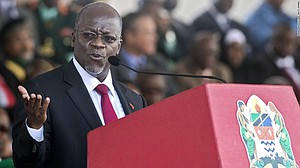9/25/2018

By Bukola Adebayo and Damilola Odutayo, CNN
(CNN) -- Tanzania's government directive to suspend family planning commercials in the country has generated concerns about birth control policies in the country.
The government last week contacted agencies funded by the United States Agency for International Development (USAID) that are involved in birth control projects and told them to stop running any family planning content in the media, a directive that rights group Amnesty International called an attack on the sexual and reproductive health of people in the East African country.
"There's no doubt that sexual and reproductive rights are coming under increasing attack in Tanzania," said Seif Magango, Amnesty International's Deputy Director for East Africa, the Horn and the Great Lakes. "The government's deplorable decision to pull these family planning ads comes less than two weeks after the president made derogatory remarks about Tanzanians wishing to exercise their fundamental right to make decisions about their bodies."
President John Magufuli told women at a September public event to stop using birth control to increase the country's population.
He urged them to keep reproducing, as the government was building more hospitals and investing in maternal health.
"They are afraid they will not be able to feed their children. They do not want to work hard to feed a large family, and that is why they opt for birth controls and end up with one or two children only," said Magufuli, who has two children.
Amnesty International called on the government to remove laws and others barriers to women and girl's access to information and services they need to live healthier lives.
"The Tanzanian authorities must immediately stop obstructing access to sexual and reproductive health services and end the intimidation of anyone providing information about such services -- be they health workers, journalists or activists," Amnesty's Magango said.
But a health ministry official told CNN the decision was to "restructure and review" media advertisements on birth control.
Ahmad Makuwani, director of reproductive and child health in the ministry, denied the president gave the order to pull the advertisements.
He said the president's comments only sparked the "momentum" to revisit family planning policies in the country, which included media.
"We are reviewing these adverts, some of them are outdated. Most of the messages are not catering for the new generation," he said.
Tanzania's population is around 53 million people, and 70% of them living on less than $2 a day, according to a 2015 World Bank report.
The United Nations Population Fund, which supports and advocates for improved access to family planning services in many African countries, said its programs were guided by the International Conference on Population and Development agreement, which Tanzania has signed.
"A core part of this agreement is to ensure that women have the power and means to access information and services to enable them to decide on the timing, spacing, and number of children," UNFPA said in an emailed statement to CNN.
It added that an estimated 214 million women in developing countries are at risk of unintended pregnancy because of an unmet need for family planning
